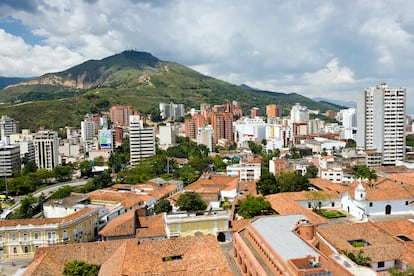Cali’s 8,000-hotel hoax
At least a dozen Colombian publications republished a figure that had allegedly come from the city’s Chamber of Commerce — which has since disavowed the number

Sol&Luna, Kissme, Paraísmo Romano and Deseos. They’re not romantic ballads, nor nightclubs, as people outside Cali, the capital of Colombia’s Valle del Cauca, might suppose. They’re actually a few of the iconic motels in western Colombia’s first city, which since 2022 have made headlines in major media sources like Pulzo and El Tiempo, accompanied by the ubiquitous statistic that the metropolis has some 7,950 of such establishments. The staggering figure went viral on social media, and even became a trending topic on X. But Cali’s Chamber of Commerce, the supposed source of that figure, only has record of 180 registered hotels.
The origin of the hoax is unclear, but it did appear back in September 2022 in a ranked list of cities based on their love hotels that was published by RCN Radio, which cited as its source the Chamber of Commerce of each municipality. Cali was at the top of the rankings. Next came Barranquilla, with 800 such motels, then Bogotá with 681 such establishments. Nonetheless, Cali’s Chamber of Commerce told EL PAÍS that it only has information on 180 motels, and that of Bogotá says that in 2023, the capital only had 279 on the books.
Fake news echoing across various media sources is nothing new; a month ago, various newspapers swore that a recent study showed that chicharrón (pork rinds) is healthier than certain vegetables, despite the fact that such a study never existed. In the case of the motels, data seemed to support the idea that Cali is “the city of love,” as even its former mayor, Jorge Iván Ospina, called it in 2020. The concept led to the naming of the ASOAMAR (Association of Motels, Furnished Apartments and Residences in Valle del Cauca), which, according to spokesperson Orlando Pérez, represents about 13,000 “residences” that exist across the 41 municipalities in the department of Valle del Cauca. Pérez tells EL PAÍS that there are thousands in Cali alone, but that many are either unregistered or do not appear as motels in official documentation.
The motel crisis
Aside from the figure being erroneous, the current reality for moteliers is a bit bleak. ASOAMAR says that a few years ago, motels provided a certain discretion that was highly prized by clients, given that such places usually do not keep a record of visitor’s information. But in recent years, competitors such as Airbnb have emerged who offer the same anonymity, and that provide larger spaces, sometimes at better prices. All with minimal industry restrictions, and growing supply of options.
Pérez also cites a generational paradigm shift when it comes to sex, which has diminished the use of these spaces. Sociologist Viviam Unás, who has studied Cali’s motels, agrees. She says that, as a university professor, she has seen evidence of this change in her classes with younger students. “The motel fulfilled a need that likely had to do with the idea that sexuality, except for that which was formally exercised within the institution of marriage, was not allowed. That has changed, thanks to younger generations,” she says.
The pandemic and its subsequent lockdown also delivered a blow to the motels. The National Association of Hotel Industry Owners of Colombia (InHotelCo), which represents hotels, motels and hostels, says that the industry has only returned to about 40% of its pre-pandemic earnings. Due to these dismal figures, motel owners and other proprietors have warned that the industry could be in trouble.
In light of these difficulties, in 2023, August 29 was declared Motel Day. They chose the date as a prelude to the Day of Love and Friendship, which in Colombia is celebrated on the third Saturday of September. “We want to invite Colombians to visit us and enjoy our service, have a new experience and get out their routine to give their love new life,” says InHotelCo in a press statement that announced their strategy to recast their image, once dedicated to furtive encounters, to one focused on connecting as a couple.
Sign up for our weekly newsletter to get more English-language news coverage from EL PAÍS USA Edition
Tu suscripción se está usando en otro dispositivo
¿Quieres añadir otro usuario a tu suscripción?
Si continúas leyendo en este dispositivo, no se podrá leer en el otro.
FlechaTu suscripción se está usando en otro dispositivo y solo puedes acceder a EL PAÍS desde un dispositivo a la vez.
Si quieres compartir tu cuenta, cambia tu suscripción a la modalidad Premium, así podrás añadir otro usuario. Cada uno accederá con su propia cuenta de email, lo que os permitirá personalizar vuestra experiencia en EL PAÍS.
¿Tienes una suscripción de empresa? Accede aquí para contratar más cuentas.
En el caso de no saber quién está usando tu cuenta, te recomendamos cambiar tu contraseña aquí.
Si decides continuar compartiendo tu cuenta, este mensaje se mostrará en tu dispositivo y en el de la otra persona que está usando tu cuenta de forma indefinida, afectando a tu experiencia de lectura. Puedes consultar aquí los términos y condiciones de la suscripción digital.









































